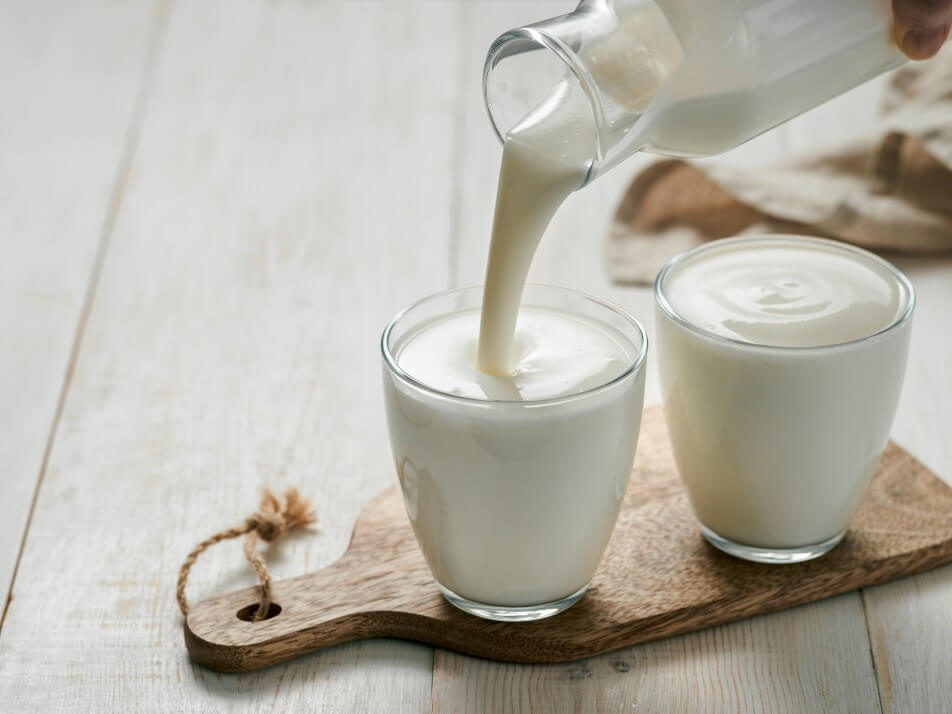If you suffer from acid reflux or GERD, you will likely spend mealtimes avoiding certain foods to minimize the amount of acid in your stomach.
Milk may be one of the foods on your avoid list, thanks to its ability to exacerbate heartburn; but what’s a good alternative? Enter almond milk, whose alkaline base helps neutralize the acid in your stomach and limit the symptoms of GERD.
Continue reading to discover what causes acid reflux, why almond milk is an excellent alternative to the dairy variety and the best way to enjoy this tasty beverage.
What is Acid Reflux?
Acid reflux - also known as heartburn, pyrosis, or acid indigestion - is a common problem that causes a burning pain in the lower area of the chest.
According to the American College of Gastroenterology, more than 60 million Americans experience monthly heartburn.
Acid reflux occurs when the sphincter (the circular band of muscle that closes food into the stomach) weakens or relaxes, allowing acid to travel back up the esophagus.
Particular food aggravates acid reflux more than others.
These include alcohol, orange juice, coffee, tomatoes, grapefruits, fried foods, spicy foods, and chocolate.
In addition, you can trigger heartburn when you consume large quantities of food.
Symptoms of acid reflux include a burning pain in the chest combined with a sour taste at the back of the throat.
And these symptoms generally worsen if you bend over or lie down. Other signs of heartburn include hiccups or a cough.
If acid reflux occurs more than twice a week, a doctor may diagnose you with GERD - or Gastroesophageal reflux disease.

Is Almond Milk Good for Acid Reflux?
The problem with dairy milk is that it contains a lot of fat. This fat can relax the sphincter, which makes it easier for acid to escape from the stomach into the esophagus.
If you can opt for an alternative source of milk such as almond milk.
These dairy-free, plant-based drinks are a great compromise; replacing whole-fat cow milk with plant-based almond milk should see a reduction in the symptoms of your acid reflux.
Almond milk has a nutty almond flavor with a creamy texture. It’s an excellent option for vegans or lactose intolerant people as it has no cholesterol, no lactose, and low-fat levels.
In addition, it comes with a wealth of nutrients such as magnesium and calcium.

Why Does Almond Milk Help Acid Reflux?
There are a couple of reasons why almond milk helps acid reflux.
The first is that it doesn’t have the same fat content as dairy varieties. This reduced fat content has less impact on the sphincter and doesn’t prevent the valve from functioning.
The second reason almond milk helps acid reflux is its alkaline composition. This helps to relieve the symptoms of acid reflux by neutralizing stomach acid.
Cow’s milk has a 6.8 pH value, whereas almond milk has an 8.4 pH, so it’s easy to see how this belief originated.
But scientists need to conduct more research to reach a definitive conclusion.
How Much Almond Milk Should I Drink With Acid Reflux?
How much almond milk you should drink depends on its type.
For example, if you’re drinking sweetened almond milk, it will possess extra calories or sugar than an unsweetened variety.
In this case, you’ll want to avoid overconsumption which could lead to weight gain.
While almonds have a 50% fat content and high-calorie content, the same is not true of almond milk. And unsweetened varieties are a great, low-calorie beverage that you can drink a fair amount of without adverse side effects.
Among the more common negative side effects of almond milk consumption is stomach problems, most likely due to the presence of carrageenan.
The best way to limit this risk is to check the label and avoid products that contain carrageenan.
In general, stick to one or two glasses of almond milk per day. and monitor how it affects your body.
Can Almond Milk Cause Acid Reflux?
While the alkaline constitution and low-fat content of almond milk make it a great product to reduce the symptoms of acid reflux, there is one ingredient that consumers should be aware of.
Carrageenan is an additive that producers add to their products to help thicken and preserve them.
And carrageenan is present in many dairy-free drinks, so it’s worth checking the label.
This additive has faced an array of controversy since the 1960s, with many scientists questioning its negative health impacts.
There is evidence suggesting that carrageenan can cause inflammation and ulcers and could potentially damage your digestive system.
And these digestive issues only serve to exacerbate acid reflux. In summary, check the label and avoid carrageenan where possible. While the evidence is inconclusive, it’s better not to take the risk if you can avoid it.

Is Soy Milk Better for Acid Reflux Than Almond Milk?
Soy milk is an excellent choice for people who suffer from acid reflux as it contains less fat than the majority of dairy products.
Both soy and almond milk possess similar nutritional values - the main difference is that soy milk has significantly more protein.
While both lactose-free options are great to combat the symptoms of acid reflux, soy milk may be better if you have a particular sensitivity to fatty foods.
On the other hand, almond milk offers high fiber levels, which are great for soaking up excess acid in the stomach.
These low-acid, dairy-free drinks are both good options for people suffering from acid reflux.
Different people react differently to each, so it may be worth trying both to see which one works best for you.
Related: Almond Milk vs. Soy Milk Compared
Is Almond Milk Yogurt Good for Acid Reflux?
Most types of yogurt can help alleviate the symptoms of heartburn with their soothing nature and probiotics.
In general, you’ll want to avoid any yogurt with high-fat content, so almond milk yogurt makes a great snack. Whole fat yogurt can be challenging for the body to digest, exacerbating heartburn symptoms. Whereas a low-fat yogurt, such as an almond milk substitute, provides the probiotic benefits without the drawbacks.

Can Hot or Warm Almond Milk Help Acid Reflux?
When it comes down to it, the benefits of almond milk on acid reflux or GERD, there are a lot of hypotheses and a lack of substantial scientific evidence.
The main idea is that the alkaline properties of milk help neutralize stomach acids, while the low-fat properties reduce the chance of heartburn occurring in the first place. Hypothetically, these two benefits should remain regardless of whether the milk is hot, warm, or cold.
It’s impossible to say until scientists conduct more research in the field, but there’s nothing to suggest that hot or warm milk would have any different effect than cold milk - so it all comes down to your personal preference.
Is Almond Milk Good for GERD?
Many people believe that almond milk helps with GERD thanks to its high alkaline composition and low levels of saturated fat.
It makes sense to think that low-fat milk helps prevent acid reflux from occurring in the first place and that an alkaline-rich beverage could help dilute the stomach’s acid - but there is a lack of scientific evidence to support this conclusion.
It’s possible that skimmed milk (which has a significantly reduced fat content) may be just as good a candidate to relieve heartburn symptoms.
Conclusion
Acid reflux can really get you down by restricting one of life’s simple pleasures (eating) and leaving you craving the foods from your banned list. One way to combat this is to find suitable alternatives to the foods you usually enjoy.
Almond milk may be a good dairy substitute thanks to its low fat and high alkaline properties, but there is a lack of scientific evidence to prove this.
The best option is to consult your doctor and try different types of milk to find out which works best for you.
